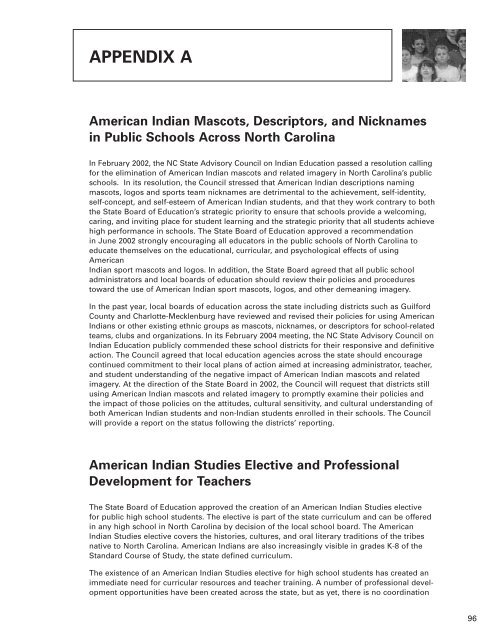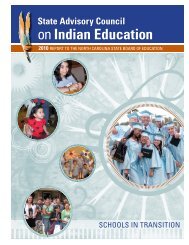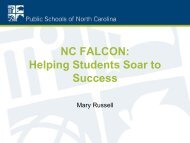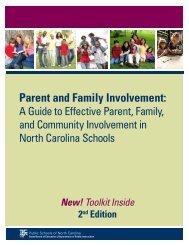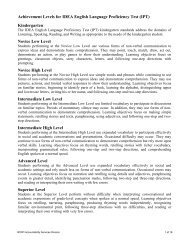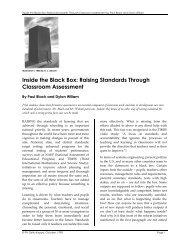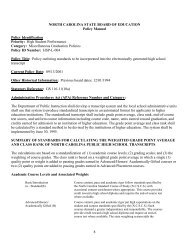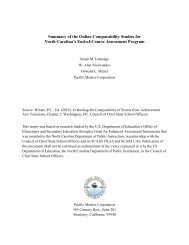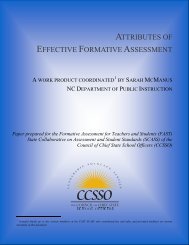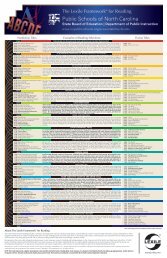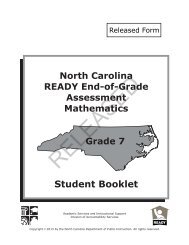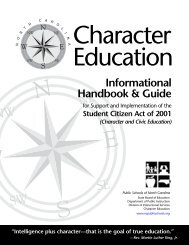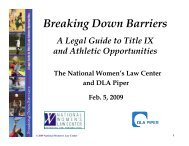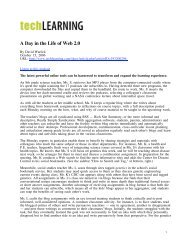pdf, 2.0mb - Public Schools of North Carolina
pdf, 2.0mb - Public Schools of North Carolina
pdf, 2.0mb - Public Schools of North Carolina
You also want an ePaper? Increase the reach of your titles
YUMPU automatically turns print PDFs into web optimized ePapers that Google loves.
APPENDIX A<br />
American Indian Mascots, Descriptors, and Nicknames<br />
in <strong>Public</strong> <strong>Schools</strong> Across <strong>North</strong> <strong>Carolina</strong><br />
In February 2002, the NC State Advisory Council on Indian Education passed a resolution calling<br />
for the elimination <strong>of</strong> American Indian mascots and related imagery in <strong>North</strong> <strong>Carolina</strong>’s public<br />
schools. In its resolution, the Council stressed that American Indian descriptions naming<br />
mascots, logos and sports team nicknames are detrimental to the achievement, self-identity,<br />
self-concept, and self-esteem <strong>of</strong> American Indian students, and that they work contrary to both<br />
the State Board <strong>of</strong> Education’s strategic priority to ensure that schools provide a welcoming,<br />
caring, and inviting place for student learning and the strategic priority that all students achieve<br />
high performance in schools. The State Board <strong>of</strong> Education approved a recommendation<br />
in June 2002 strongly encouraging all educators in the public schools <strong>of</strong> <strong>North</strong> <strong>Carolina</strong> to<br />
educate themselves on the educational, curricular, and psychological effects <strong>of</strong> using<br />
American<br />
Indian sport mascots and logos. In addition, the State Board agreed that all public school<br />
administrators and local boards <strong>of</strong> education should review their policies and procedures<br />
toward the use <strong>of</strong> American Indian sport mascots, logos, and other demeaning imagery.<br />
In the past year, local boards <strong>of</strong> education across the state including districts such as Guilford<br />
County and Charlotte-Mecklenburg have reviewed and revised their policies for using American<br />
Indians or other existing ethnic groups as mascots, nicknames, or descriptors for school-related<br />
teams, clubs and organizations. In its February 2004 meeting, the NC State Advisory Council on<br />
Indian Education publicly commended these school districts for their responsive and definitive<br />
action. The Council agreed that local education agencies across the state should encourage<br />
continued commitment to their local plans <strong>of</strong> action aimed at increasing administrator, teacher,<br />
and student understanding <strong>of</strong> the negative impact <strong>of</strong> American Indian mascots and related<br />
imagery. At the direction <strong>of</strong> the State Board in 2002, the Council will request that districts still<br />
using American Indian mascots and related imagery to promptly examine their policies and<br />
the impact <strong>of</strong> those policies on the attitudes, cultural sensitivity, and cultural understanding <strong>of</strong><br />
both American Indian students and non-Indian students enrolled in their schools. The Council<br />
will provide a report on the status following the districts’ reporting.<br />
American Indian Studies Elective and Pr<strong>of</strong>essional<br />
Development for Teachers<br />
The State Board <strong>of</strong> Education approved the creation <strong>of</strong> an American Indian Studies elective<br />
for public high school students. The elective is part <strong>of</strong> the state curriculum and can be <strong>of</strong>fered<br />
in any high school in <strong>North</strong> <strong>Carolina</strong> by decision <strong>of</strong> the local school board. The American<br />
Indian Studies elective covers the histories, cultures, and oral literary traditions <strong>of</strong> the tribes<br />
native to <strong>North</strong> <strong>Carolina</strong>. American Indians are also increasingly visible in grades K-8 <strong>of</strong> the<br />
Standard Course <strong>of</strong> Study, the state defined curriculum.<br />
The existence <strong>of</strong> an American Indian Studies elective for high school students has created an<br />
immediate need for curricular resources and teacher training. A number <strong>of</strong> pr<strong>of</strong>essional development<br />
opportunities have been created across the state, but as yet, there is no coordination<br />
96


